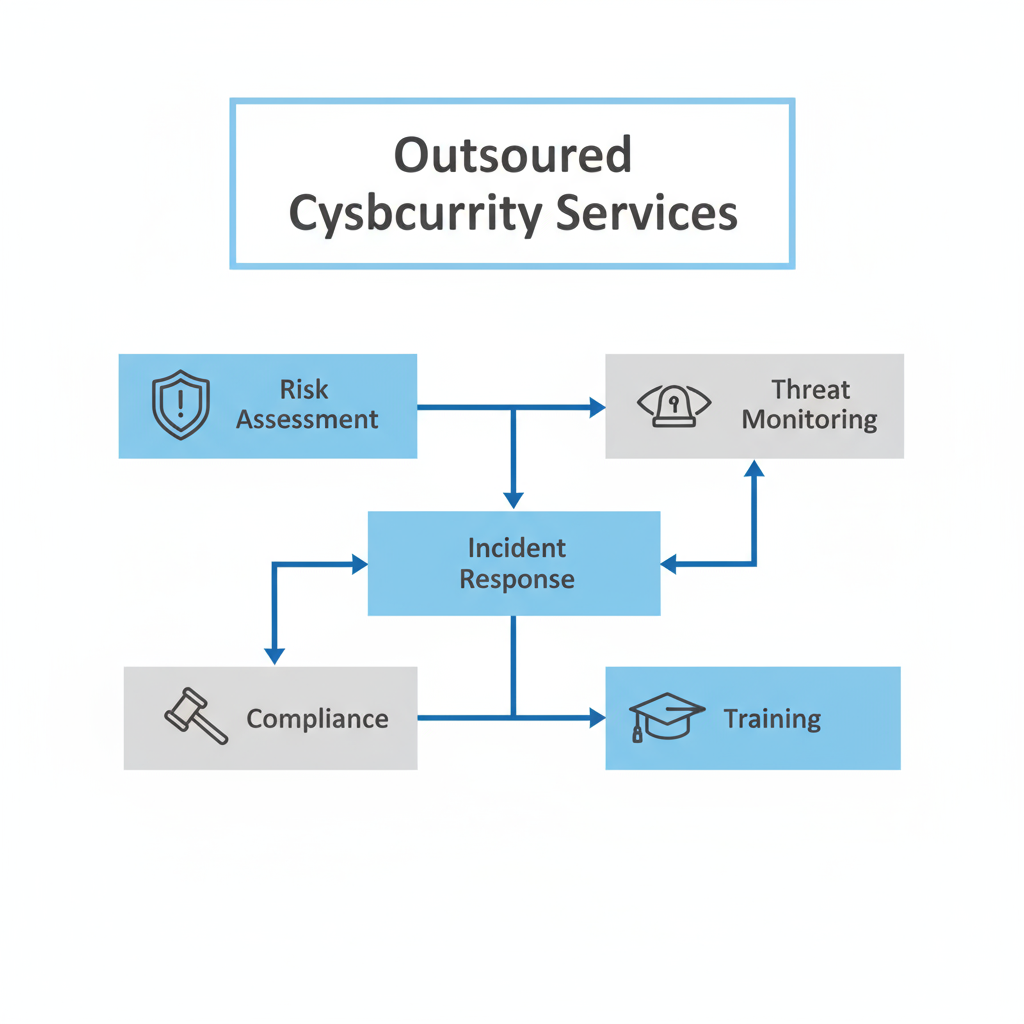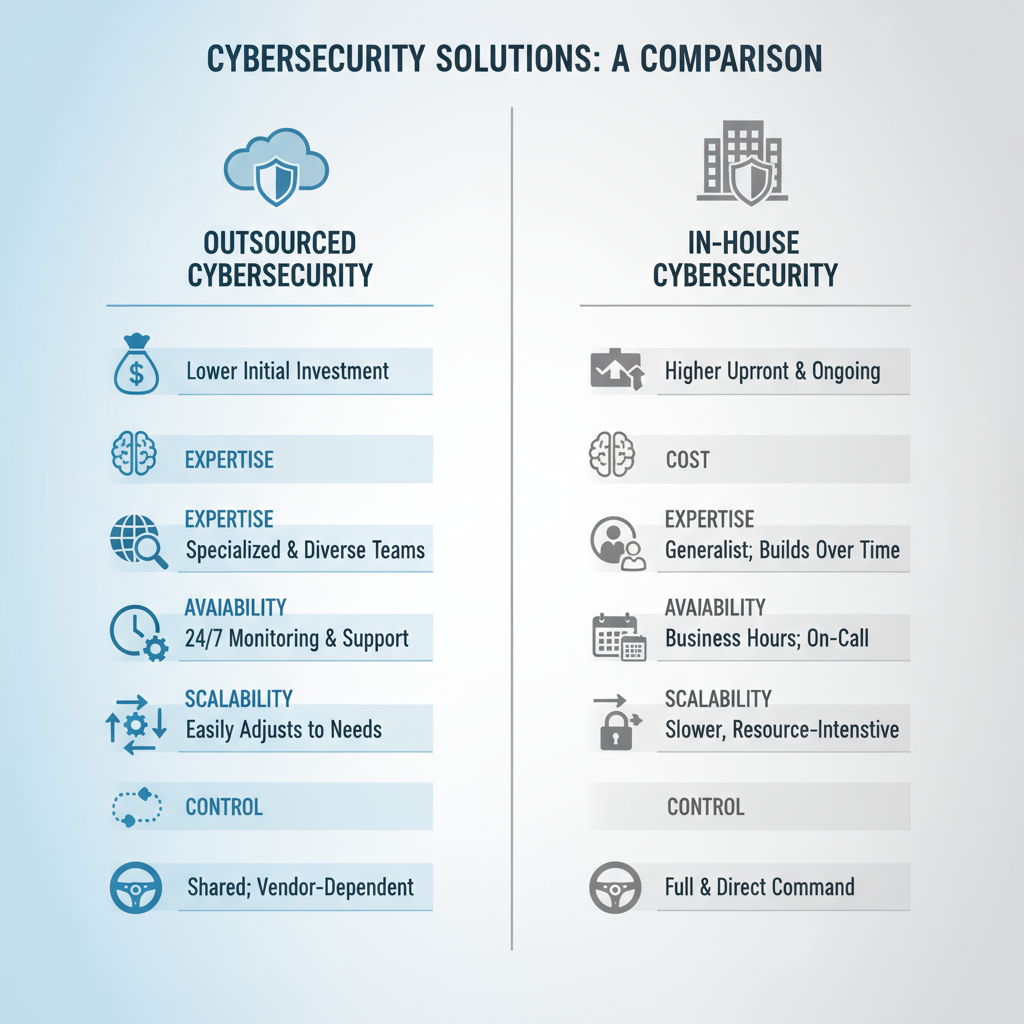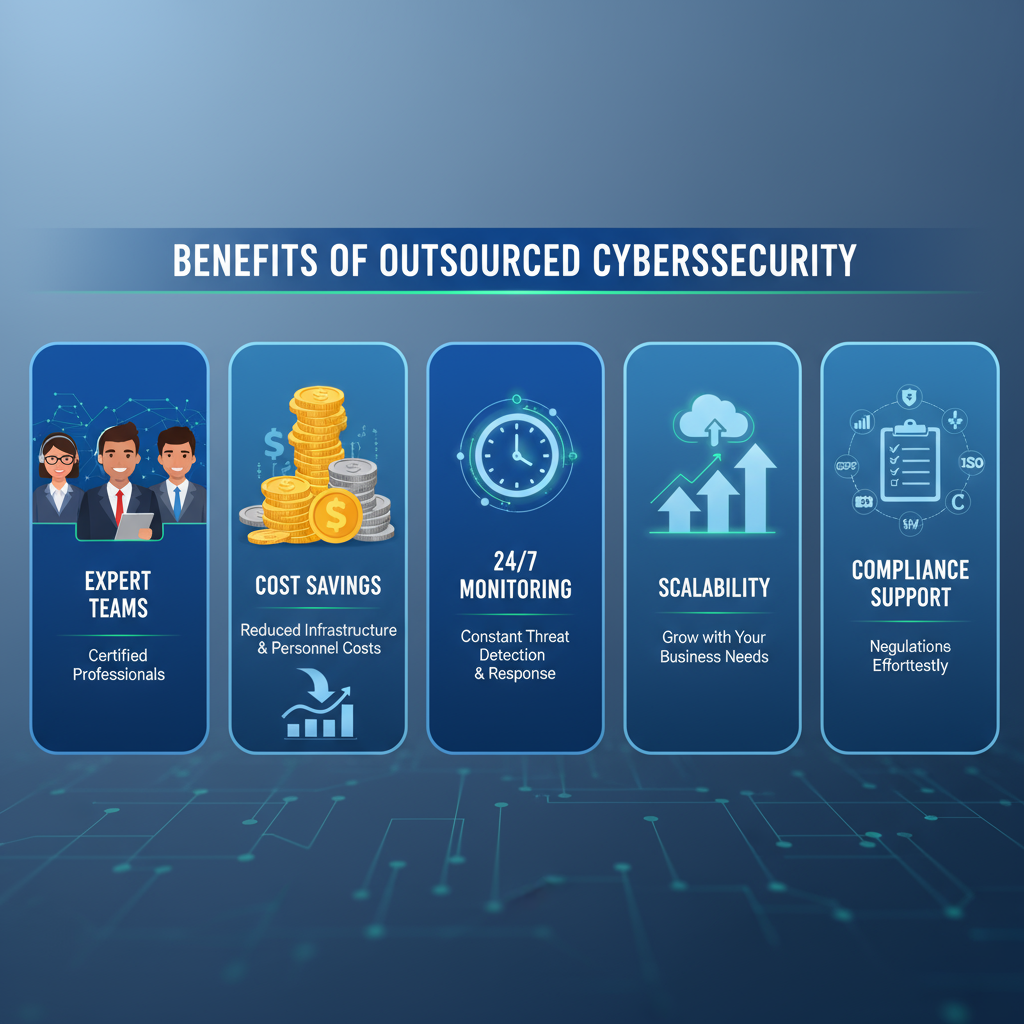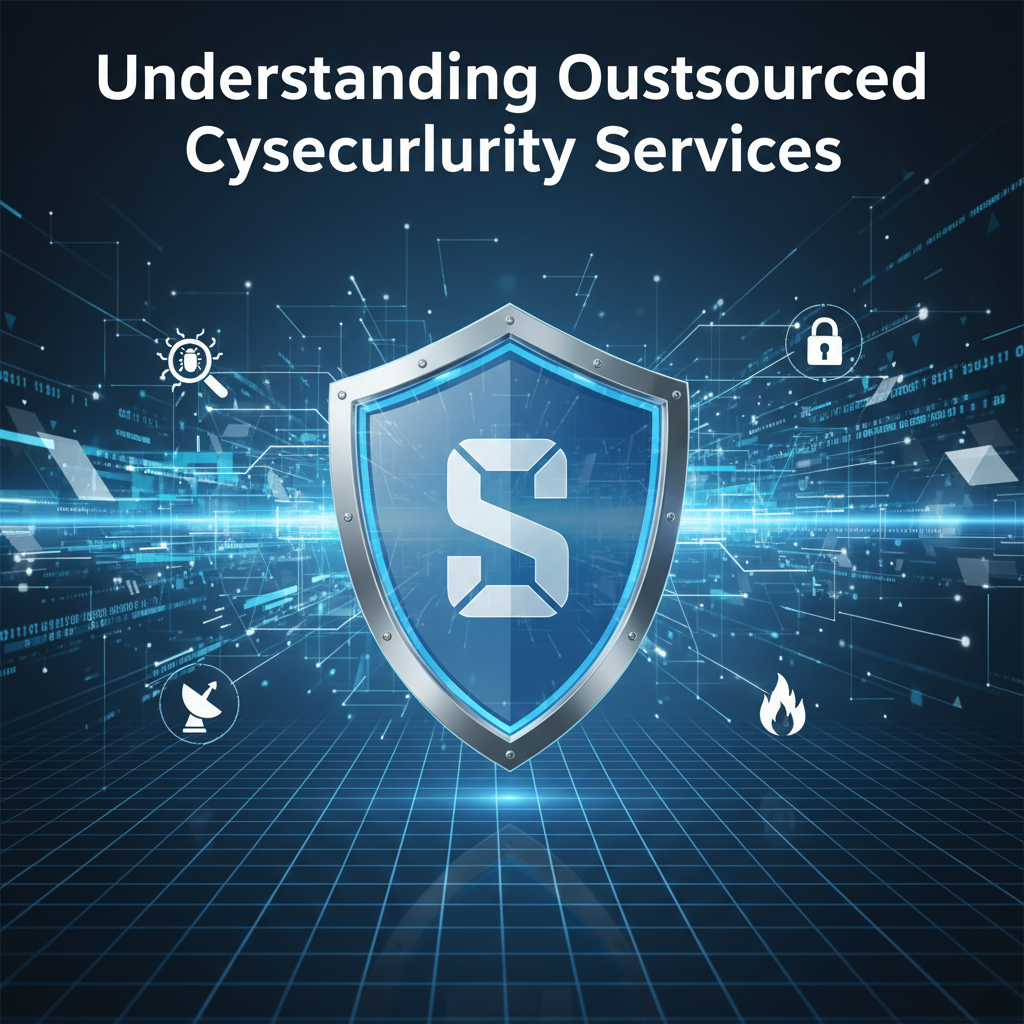Summary
With cyber threats evolving faster than ever before, businesses of all sizes are struggling to keep up with the complexity of digital security. According to recent reports, 32% of businesses experienced a cybersecurity breach or attack in 2023, a reminder that no organization is immune.
To combat these growing challenges, many companies are turning to outsourced cybersecurity services — a strategic solution that gives them access to advanced tools, expert professionals, and round-the-clock protection without the heavy investment of building an in-house team.
This guide explores everything you need to know about outsourced cybersecurity — what it is, why it’s beneficial, how it compares to in-house solutions, and how to choose the right service provider for your organization.
By the end of this article, you’ll have a clear understanding of how outsourcing can strengthen your organization’s cyber resilience and help you stay ahead in an increasingly hostile digital world.
In today’s interconnected business environment, cybersecurity is no longer optional — it’s essential. Every day, organizations face threats like ransomware, phishing attacks, data breaches, and insider threats. And with the rise of remote work, cloud-based operations, and digital transactions, vulnerabilities have multiplied.
Unfortunately, many businesses — especially small and medium-sized enterprises — lack the internal resources to manage cybersecurity effectively. This gap has given rise to a practical solution: outsourced cybersecurity services.
Outsourcing cybersecurity means partnering with third-party experts, often referred to as Managed Security Service Providers (MSSPs), who specialize in monitoring, detecting, and responding to cyber threats. These professionals bring cutting-edge technology, decades of expertise, and 24/7 vigilance to protect your organization’s systems, networks, and data.
Let’s dive deeper into what these services involve and how they can help your business stay secure.
What Are Outsourced Cybersecurity Services?

Outsourced cybersecurity services involve delegating part or all of your cybersecurity operations to a specialized external partner. This approach allows organizations to tap into professional-grade protection without having to hire, train, and maintain an in-house team of experts.
Scope of Outsourced Cybersecurity
Depending on your organization’s needs, outsourcing can range from comprehensive, end-to-end cybersecurity management to targeted support in specific areas. Some of the key services include:
- Risk Assessment & Vulnerability Scanning: Identifying weak points in systems and applications.
- Threat Monitoring & Detection: Using advanced tools like SIEM (Security Information and Event Management) to detect suspicious activity.
- Incident Response: Managing and mitigating security breaches.
- Security Strategy & Compliance: Helping your business meet regulations like GDPR, HIPAA, or ISO 27001.
- Cyber Forensics: Investigating and analyzing cyber incidents for root causes.
- Security Awareness Training: Educating employees about cyber hygiene and phishing prevention.
Outsourcing can either replace an internal security department entirely or augment your existing IT team, providing specialized expertise and scalable solutions.
The Growing Importance of Cybersecurity Outsourcing
The global digital landscape is expanding rapidly — and so are the threats. Cybercriminals are becoming more sophisticated, using AI-driven attacks, ransomware-as-a-service models, and social engineering to infiltrate even well-protected organizations.
In this environment, cybersecurity outsourcing has gained momentum for several reasons:
- Shortage of skilled professionals: There’s a global cybersecurity talent gap — companies struggle to hire and retain experts.
- Rising compliance requirements: Data privacy laws require organizations to maintain rigorous security measures, which can be hard to manage internally.
- Increased remote work: More endpoints mean more vulnerabilities to monitor.
- Cost efficiency: Outsourcing provides enterprise-grade security without the financial burden of a full-time team.
In short, outsourced cybersecurity is not just a trend — it’s a necessity for businesses seeking resilience in a rapidly evolving digital world.
Why Businesses Choose to Outsource Cybersecurity
Outsourcing cybersecurity isn’t just about convenience — it’s about strategy. Let’s look at the major reasons why businesses are making this move.
Access to Expertise and Advanced Technology
Cybersecurity is complex. It demands constant vigilance, up-to-date knowledge, and access to advanced tools. Managed Security Service Providers (MSSPs) employ teams of highly skilled, certified experts who specialize in different areas — from threat intelligence to ethical hacking.
They use sophisticated technologies like AI-based monitoring systems, intrusion detection, endpoint protection, and security automation — tools that many companies can’t afford or manage internally. This access ensures your organization benefits from the latest innovations in cyber defense.
Cost Efficiency
Maintaining an internal cybersecurity team can cost hundreds of thousands of pounds annually — including salaries, training, and infrastructure. Outsourcing eliminates these overheads, offering flexible pricing models such as monthly or annual subscriptions.
Instead of investing in expensive tools and ongoing staff development, you get enterprise-level security at a fraction of the cost. This is especially advantageous for small and mid-sized businesses that want professional protection without breaking the budget.
Focus on Core Business
Cybersecurity management can consume valuable time and resources. By outsourcing, companies free up their internal teams to focus on core business activities such as innovation, marketing, and customer service.
While the external team manages complex cyber threats, your organization can direct its energy towards growth and productivity, confident that security is being handled by professionals.
Scalability and Flexibility
Cybersecurity requirements aren’t static — they evolve as your business grows or faces new threats. Outsourced cybersecurity services are scalable.
Whether you’re launching new products, entering new markets, or adapting to regulatory changes, your MSSP can adjust its services to meet your needs. You only pay for what you use, and scaling up or down is seamless.
Proactive Threat Management
Instead of responding to incidents after they happen, outsourced cybersecurity providers take a proactive approach. They monitor systems 24/7, identify vulnerabilities before attackers exploit them, and respond instantly to suspicious activity.
This proactive stance reduces the likelihood of breaches, downtime, and financial losses — giving you peace of mind that your data is always under watchful eyes.
Comparison: Outsourced vs In-House Cybersecurity Teams

Here’s a detailed look at how outsourcing compares to managing cybersecurity internally:
| Criteria | In-House Cybersecurity | Outsourced Cybersecurity Services |
| Cost | High (salaries, training, infrastructure) | Lower and predictable (subscription-based) |
| Expertise | Limited to internal staff skills | Access to diverse, global experts |
| Availability | Standard business hours | 24/7/365 monitoring and response |
| Technology | May lag due to budget limits | Advanced, continuously updated tools |
| Scalability | Requires recruitment and setup | Instantly scalable |
| Control | Full internal control | Shared oversight with vendor |
| Compliance Support | May need external consultants | Included in most MSSP offerings |
While in-house teams offer more control and business familiarity, outsourced services provide agility, expertise, and scalability. Many companies find that a hybrid approach — combining internal oversight with outsourced support — offers the best of both worlds.
Benefits of Outsourcing Cybersecurity Services

Let’s look at the tangible benefits businesses experience when they outsource cybersecurity operations.
Enhanced Security Posture
Outsourced cybersecurity firms use a multi-layered approach, employing intrusion detection, endpoint protection, encryption, and advanced firewalls. Their expertise strengthens your organization’s overall defensive posture, ensuring fewer vulnerabilities and faster threat detection.
Access to Global Threat Intelligence
External providers have visibility into global threat trends across industries. This allows them to identify emerging threats before they reach your organization. They use threat intelligence feeds and predictive analytics to anticipate and mitigate risks proactively.
Faster Incident Response
MSSPs have dedicated incident response teams that act immediately when a breach occurs. They follow predefined protocols to contain, mitigate, and recover from attacks — significantly reducing downtime and financial impact.
Regulatory Compliance
With increasing data privacy laws worldwide, compliance is now a business imperative. Outsourced providers help organizations meet standards like GDPR, ISO 27001, PCI DSS, and HIPAA.
They conduct regular audits, maintain documentation, and ensure your cybersecurity policies meet global regulatory standards — helping avoid costly penalties.
Business Continuity
In case of a cyberattack, MSSPs implement disaster recovery and backup strategies to keep your operations running. Business continuity planning ensures minimal disruption, maintaining customer trust and revenue flow.
Potential Challenges of Outsourcing
While outsourcing offers significant benefits, it also comes with challenges that must be managed carefully.
- Loss of Control: Since an external provider manages your security, visibility may be limited.
- Data Privacy Concerns: You must trust your vendor with sensitive data.
- Vendor Dependency: Over-reliance on a provider can be risky if service quality drops.
- Communication Barriers: Misalignment between internal teams and vendors can delay responses.
Mitigation Strategies
- Choose providers with transparent communication policies.
- Use Service Level Agreements (SLAs) that clearly define expectations.
- Conduct regular audits and performance reviews.
- Implement hybrid management, where internal leaders oversee vendor performance.
The Hybrid Cybersecurity Model
Many businesses find the perfect balance by combining both in-house and outsourced cybersecurity.
In this hybrid model, internal teams handle strategic oversight, while external providers manage operational tasks like monitoring and incident response.
Advantages of a Hybrid Approach
- Retains internal control and visibility.
- Access to specialized external skills and technologies.
- Cost-efficient and flexible.
- Faster response to incidents.
For instance, an internal team might focus on compliance and data governance, while the outsourced partner manages 24/7 threat detection and vulnerability management.
How to Choose the Right Cybersecurity Service Provider
Choosing the right partner is crucial. Here’s a step-by-step guide:
Identify Your Needs
Determine whether you need full-service cybersecurity management or specific support areas like network monitoring, compliance, or data protection.
Evaluate Provider Credentials
Check for certifications such as ISO 27001, SOC 2, and GDPR compliance. Review client testimonials, case studies, and industry experience.
Review Service Level Agreements (SLAs)
Your SLA should clearly define:
- Scope of services
- Incident response timelines
- Data privacy obligations
- Performance metrics
This ensures mutual understanding and accountability.
Check for Transparency and Support
A trustworthy provider should offer real-time dashboards, regular performance reports, and open communication channels.
Request a Pilot Project
Before signing a long-term contract, start with a trial or pilot period. This helps evaluate responsiveness, technology integration, and service quality.
The Future of Outsourced Cybersecurity
The future of cybersecurity outsourcing is being shaped by rapid advancements in technology.
Some key trends include:
- Artificial Intelligence & Machine Learning: For predictive threat detection.
- Zero-Trust Architecture: Restricting access to prevent breaches.
- Cybersecurity-as-a-Service (CSaaS): Affordable solutions for SMEs.
- Cloud-Native Security: Protecting hybrid and multi-cloud environments.
- Automation: Streamlining response and reducing manual workload.
As cyber threats evolve, outsourced services will continue to be the cornerstone of proactive defense strategies for businesses worldwide.
Conclusion
In a world where digital threats grow in complexity every day, outsourced cybersecurity services offer businesses the protection and flexibility they need to thrive securely.
They combine advanced tools, deep expertise, and round-the-clock monitoring — ensuring that no threat goes undetected. Whether you fully outsource, retain an in-house team, or adopt a hybrid model, the goal remains the same: to protect your organization’s data, operations, and reputation.
Prioritizing cybersecurity is not just an IT decision — it’s a business survival strategy. The sooner organizations embrace professional cybersecurity support, the better equipped they’ll be to face the challenges of the digital age.
FAQs
What are outsourced cybersecurity services?
Outsourced cybersecurity services involve hiring third-party experts to manage, monitor, and secure your digital systems from cyber threats.
What are the benefits of outsourcing cybersecurity?
The main benefits include cost savings, access to specialized expertise, 24/7 monitoring, regulatory compliance, and scalability.
Is outsourcing cybersecurity safe?
Yes — as long as you choose reputable providers with strong credentials, data protection measures, and clear SLAs.
What services do outsourced cybersecurity providers offer?
They typically offer threat detection, vulnerability assessments, incident response, compliance audits, and continuous monitoring.
What’s the difference between outsourcing and having an in-house cybersecurity team?
Outsourcing offers cost efficiency and diverse expertise, while in-house teams provide direct control and deeper familiarity with company systems.
Can I combine both in-house and outsourced security?
Yes — many organizations adopt a hybrid model, keeping strategic control internally while outsourcing operational security.
I’m Debabrata Behera, a passionate blogger sharing insights, tips, and stories across diverse topics. Through my writing, I aim to inspire, inform, and connect with readers worldwide.

